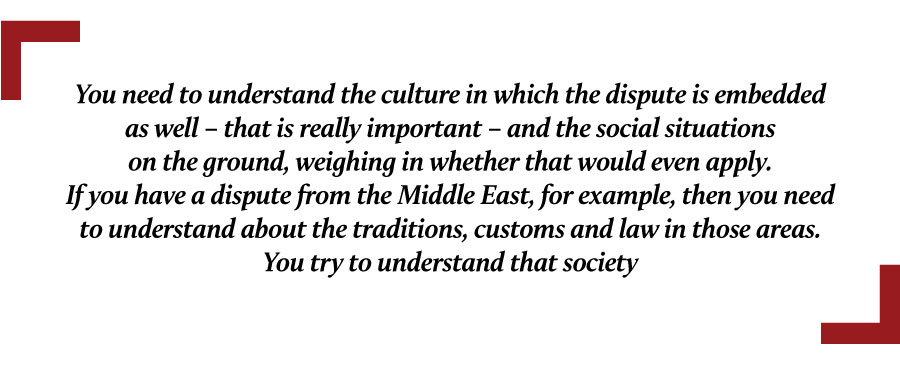In an exclusive interview for Asia Business Law Journal, Canadian Justice Beverley McLachlin talks to Edward R Chin about her role as an overseas judge in Hong Kong
Inviting overseas judges to sit in local Hong Kong courts when they have not practised in the jurisdiction, nor are they versed in the local language or culture, might raise some eyebrows.
However, this is common practice in Hong Kong, and is enshrined in the city’s version of a constitution, the Basic Law, where the power of final adjudication is “vested in the Court of Final Appeal of the region, which may as required invite judges from other common law jurisdictions to sit on the Court of Final Appeal”.
Justice McLachlin is Hong Kong’s first woman non-permanent justice. She served as the Chief Justice of Canada from 2000 to mid-December 2017, and is the longest serving chief justice in Canadian history. In June 2018, she became a Companion of the Order of Canada, the highest honour that can be bestowed on a civilian in that nation. A published best-selling author, she is also an international judge of the Singapore International Commercial Court, and an international arbitrator.
In her memoir, titled Truth Be Told, McLachlin wrote that as a younger woman she had never considered becoming a lawyer or a judge. It was only after a conversation with her first and late husband, Rory, that she even considered applying to law school. McLachlin had set her sights on a career in philosophy because she had heard of women philosophers, but never women lawyers. From a humble background growing up on a small farm in Canada’s Alberta province, she was the first and remains the only woman in Canada to have had the role of chief justice.
When asked how she got the position of non-permanent justice in Hong Kong, McLachlin says she was simply invited by the chief justice of Hong Kong, Geoffrey Ma Tao-li.
In terms of her role in Hong Kong, she says: “I think it is very important that the international judge has a very good grounding in the law. For me, it is the common law … [but] the judge has to be able to adapt to other courts and arbitrations, to other laws and legal systems. It could be a civil system, for example, and you apply the law of whatever country is specified in the arbitration agreement, or in reference to the court.
“So basically, I think the quality that you really have to have is a pretty global understanding about how legal rules work throughout the world – the different kinds of legal systems there are. In Canada, I was fortunate because we have a civil system in the province of Quebec and we also have the common law in the other provinces. So, I was familiar with working in different systems, the civil system or a code system, as some people call it, and a common law, precedence-based system.”
Such a comprehensive legal knowledge might deter many judges from considering such a position, and McLachlin points out there are significant challenges to be faced. “First, the legal system that’s prevailing in that jurisdiction, and whatever the relevant jurisdiction is, you have to take that on, and understand it in a pretty deep sense,” she says. “Secondly, you need to understand the social and commercial context of the jurisdiction.
“And the third thing, I would say, is that I brought, at least to the task, an attitude of deference. [There are things] I don’t know when I’m judging in that jurisdiction, other than my own, and I have to learn and I have to be quite humble about how I approach the task. You have to be very careful that you don’t bring increased opposition from your own experiences from your own country … [and] you really need to adapt to what is on the ground.”
McLachlin acknowledges she brings a different perspective to the table, but says she will always apply the local laws that she has sworn to. “I think every person who judges has a perspective,” she says. “When I am in Hong Kong, my duty, my sworn duty, is to apply the law of Hong Kong, and so I am very conscious of that. So, I am not going to just apply Canadian law, I wouldn’t do that, but I might personally make mental comparisons as I’m trying to work out the case in Hong Kong, and I might bring different perspectives because of my experiences in my own country.”
She says an immersion into the local society is required before undertaking the task of a foreign judge, or even adjudicating international cases. “I tried very hard to understand the different perspectives of different people, and different groups in that society,” she says. “Understand how that society works, what problems it is facing, try to look at it all with an impartial eye and understand what the concerns of the people are. That’s what I think is quite important.
“You need to understand the culture in which the dispute is embedded as well – that is really important – and the social situations on the ground, weighing in whether that would even apply. If you have a dispute from the Middle East, for example, then you need to understand about the traditions, customs and law in those areas. You try to understand that society.”

Her experience within Hong Kong’s court system has been a positive one. “I was totally comfortable with the culture,” she says. “I just felt that it’s a wonderful court, and I was very happy to work with it, be part of it.
“As far as I can see from my experience, the judges on the Court of Final Appeal are totally impartial … whether I add any impartiality [to] the particular cases I have heard, I don’t know, but I do believe that there is perhaps some value, from the point of view of the public confidence in the system, to know that there are jurists from other countries who want to sit there, who are coming to sit there, and who are happy to sit there … these jurists themselves represent the highest tradition of impartiality around the world.”
McLachlin says the pace of legal developments necessary to keep up with trade and commercial expansion in the region is an area that has made an impression on her. “We are all aware that commercial enterprises and business trade are growing very quickly in various parts of Asia,” she says. “This is evident when you visit those countries. And the interesting thing for me as a jurist, as a lawyer, and as a judge is to see the legal developments that are central to the expansion of trade and commerce, and how they are keeping pace or meeting the demands of this phenomenal growth.
“I have always believed that a good legal system or dispute resolution system is one that guarantees impartial dispute resolution on commercial disputes and establishes a degree of certainty in the rules of the law – what the law is. I believe those are very important to continued commercial development and expansion – everything from people who want to invest, who want to know they have the security of a good legal system, to people who are making decisions on the ground, and those who look to the court for guidance, and so on. So, this is very fundamental to commercial development in the long run. And as Asia business and commerce expand, it is very important that the legal development keeps up with that.”
So is there anything she observes that Hong Kong might learn from her own Canadian legal system? “It sounds rather presumptive to say you can learn from us, but I do think that Canada has a tradition of bringing together diverse systems,” she says. “A bijural system and diverse people from all over the world, many of whom either have close ties to Asia or come from there … Canada presents a very open face, and you can learn how to judge in an open-texture society where everyone has to be respected with different traditions.
“I’m sure that there’s a very highly developed awareness of this already in Asia, but if I can bring something from the Canadian perspective, it might be respect for diversity and how to work in diverse situations.”


























